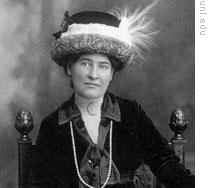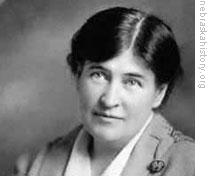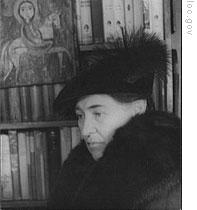VOA慢速英语 2008 1005a
搜索关注在线英语听力室公众号:tingroom,领取免费英语资料大礼包。
(单词翻译)
VOICE ONE:I'm Shirley Griffith.
VOICE TWO:
And I'm Tony Riggs with People in America. Today we tell about writer Willa Cather.
(MUSIC)
VOICE ONE:
The second half of the nineteenth century brought major changes to the United1 States. From its earliest days, America had been an agricultural2 society. But after the end of the Civil War in eighteen sixty-five, the country became increasingly3 industrial. And as the population grew, America became less unified4.
After railroads5 linked the Atlantic coast with the Pacific coast, the huge Middle West of the country was open to settlement. The people who came were almost all from Europe. There were Swedes and Norwegians, Poles and Russians, Bohemians and Germans.
Many of them failed in their new home. Some fled6 back to their old homeland. But those who suffered through the freezing winters and the burning summers and the failed crops became the new pioneers. They were the men and women celebrated7 by the American writer Willa Cather.
VOICE TWO:
 |
| Willa Cather |
Cather's best stories are about these pioneers. She told what they sought and what they gained. She wrote of their difficult relations with those who followed. And she developed a way of writing, both beautiful and simple, that made her a pioneer, too.
For many women in the nineteenth century, writing novels was just one of the things they did. For Willa Cather, writing was her life.
VOICE ONE:
Willa Cather was born in the southern state of Virginia in eighteen seventy-three. At the age of eight, her family moved to the new state of Nebraska in the Middle West. She and Nebraska grew up together.
Willa lived in the small town of Red Cloud. As a child she showed writing ability. And, she was helped by good teachers, who were uncommon8 in the new frontier9 states.
Few women of her time went to a university. Willa Cather, however, went to the University of Nebraska. She wrote for the university literary10 magazine, among her other activities. She graduated from the university in eighteen ninety-five.
VOICE TWO:
Most American writers of her time looked to the eastern United States as the cultural center of the country. It was a place where exciting things were possible. It was an escape from the flatness of the land and culture of the Middle West.
From eighteen ninety-six to nineteen-oh-one Cather worked for the Pittsburgh Daily Leader newspaper. It was in Pennsylvania, not New York, but it was farther11 east than Nebraska.
Cather began to publish stories and poems in nineteen hundred. And she became an English teacher in nineteen-oh-one. For five years, she taught English at Pittsburgh Central High School and at nearby Allegheny High School.
She published her first book in nineteen-oh-three. It was a book of poetry. Two years later she published a book of stories called "The Troll Garden."
VOICE ONE:
The owner of a New York magazine, S.S. McLure, read her stories. He asked her to come to New York City and work as an editor at McLure's Magazine. She was finally in the cultural capital of the country. She stayed with the magazine from nineteen-oh-six to nineteen twelve.
One of the people who influenced her to leave the magazine was the American woman writer, Sarah Orne Jewett. Jewett advised Cather to write only fiction and to deal with the places and characters she knew best. Jewett said it was the only way to write anything that would last.
(MUSIC)
VOICE TWO:
In nineteen twelve Willa Cather published her first novel, "Alexander's Bridge." By that time, Cather had enough faith in herself to leave magazine work and use all her time to write fiction. She remembered Jewett's advice and turned to the land and people she knew best, the farmers of the Middle West.
In Red Cloud she had lived among Bohemians, French-Canadians, Germans, Scandinavians, and other immigrants12. She saw that the mixture of all these new Americans produced a new society.
"There was nothing but land," she wrote. "Not a country at all, but the material out of which countries are made." It was this material she used to create her books.
VOICE ONE: Like all good writers, she wanted her novels to show the world she described, not just tell about it. Later in her life, she described the way she wrote. She called it "novels without furniture." What she meant was that she removed from her novels everything that was not necessary to tell the story. Fiction in the nineteenth century was filled with social detail. It had pages of description and comments by the author. Cather did not write this way. She looked to the past for her ideas, but she drew from the present for her art.
Like all good writers, she wanted her novels to show the world she described, not just tell about it. Later in her life, she described the way she wrote. She called it "novels without furniture." What she meant was that she removed from her novels everything that was not necessary to tell the story. Fiction in the nineteenth century was filled with social detail. It had pages of description and comments by the author. Cather did not write this way. She looked to the past for her ideas, but she drew from the present for her art.
A year after "Alexander's Bridge," Cather published her second novel. It was the first of her books to take place in the Middle West. It is called "O Pioneers." It established her as one of the best writers of her time.
"O Pioneers" tells the story of the first small groups of Bohemians, Czechs, French, Russians, and Swedes who set about to conquer13 the land. Cather said they acted as if they were a natural force, as strong or stronger than nature. She said they were people who owned the land for a little while because they loved it.
"Spring, summer, autumn, winter, spring," Cather wrote. "Always the same field...trees...lives."
VOICE TWO:
Cather's heroes are pioneers, settlers of unknown or unclaimed land. They also are pioneers of the human spirit.
They are, Cather said, the people who would dream great railroads across the continent. Yet she saw something more in them. It was something permanent14 within a world of continuous15 change. A sense of order in what appeared to be disorder16.
In Cather's mind, her writings about the Middle West, her prairie17 years, became a way to show approval18 of the victory19 of traditional values against countless20 difficulties21. The fight to remain human and in love with life in spite22 of everything gives the people in her stories purpose and calm.
VOICE ONE:
Willa Cather continued to write about these new pioneers in "The Song of the Lark23" in nineteen fifteen. She followed that with the novel that many consider her best, "My Antonia."
By the nineteen twenties, however, her stories began to change. She saw more defeats, fewer victories24. She began to write -- not about great dreams -- but about the smallness of man's vision25. She mourned26 for the loss27 of values others would never miss.
Willa Cather never married. She began living with another woman from Nebraska in nineteen-oh-eight. They lived together until Cather died.
In nineteen twenty-two, Cather suffered a nervous breakdown28. A number of things caused her condition. Her health was not good. She was unhappy with her publisher. And, she was angry about the changes in society brought by new technology.
In nineteen twenty-three, Cather wrote the last of her Nebraska novels, "A Lost Lady." Two years later she produced another novel, "The Professor's House." It was clear by then that she was moving in a different direction.
(MUSIC)
VOICE TWO: Her next two novels, "Death Comes for the Archbishop," and "Shadows in the Rock," take place in the distant past. They are stories about heroic29 failure. "Death Comes for the Archbishop" takes place in the American Southwest in the sixteenth century. It describes the experiences of two priests30 who are sent to what became New Mexico. The action is in the past. But the place is one that Cather felt always would remain the same -- the deserts of the American Southwest.
Her next two novels, "Death Comes for the Archbishop," and "Shadows in the Rock," take place in the distant past. They are stories about heroic29 failure. "Death Comes for the Archbishop" takes place in the American Southwest in the sixteenth century. It describes the experiences of two priests30 who are sent to what became New Mexico. The action is in the past. But the place is one that Cather felt always would remain the same -- the deserts of the American Southwest.
Where her earlier books described a person's search for solid31 ground, these books describe the solid ground itself. They came from a deep unhappiness with modern life.
VOICE ONE:
Although Cather turned away from modern life, she was very much a modern writer. Her writing became increasingly important to a new group of writers -- Ernest Hemingway, F. Scott Fitzgerald, and John Dos Passos.
Near the end of her life she wrote: "Nothing really matters but living. Get all you can out of it. I am an old woman, and I know. Sometimes people disappoint us. And sometimes we disappoint ourselves. But the thing is to go right on living."
Willa Cather went right on living until the age of seventy-four. She died in nineteen forty-seven.
(MUSIC)
VOICE TWO:
This Special English program was written by Richard Thorman. I'm Tony Riggs.
VOICE ONE:
And I'm Shirley Griffith. Join us again next week for another People in America program on the Voice of America.




